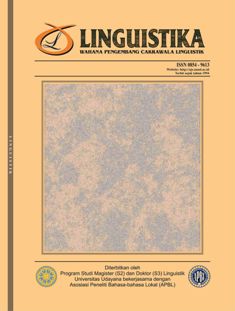JENIS-JENIS DAN BENTUK T-V YOBIKAKE OLEH REMAJA JEPANG
Abstract
This study aims to determine the types of greetings and forms of T-V greetings used by Japanese teenagers. Sources of data used are data in the form of questionnaires, list of questions, and supported by data sourced from Japanese movies and Japanese cartoons (anime).
The theory used is the theory of types of yobikake according Hiromi and Theory T-V Brown-Gillman (1960). Methods and techniques of data provision are made with questionnaires and interview methods to Japanese adolescents. Methods and techniques of data analysis are performed by referential reference method. Methods and techniques of presentation of data analysis results use informal and formal methods.
Result of research shows that there are three kinds of greeting found. The three types of greeting, personal pronouns 'ninshoo daimeshi', greeting of the suffixed name of self / form Mr / Mrs 'keishou', and greeting in the term kinship 'shinzoku yougomei'. The greetings that are found contain the T-V form. Greetings of personal pronoun of the form of T found are atashi, ore, boku, jibun, wa-shi, a-shi, wa-shitachi, atashitachi, oretachi, uchira, anta, omae, kimi, temee, omaetachi, and minna. Greetings personal pronouns of V form found are watakushi, watashi, watashitachi, anata, anatatachi, minasama and minasan. The greetings of suffixed self name containing T shapes are greetings with the suffixes ~ kun and ~ chan. The greetings of suffixed self name containing V-shapes, are greetings with suffixes ~ sama, ~ dono, and ~ san. Greetings in the term kinship that contain the form T are ojiichan, jiiji, obaachan, baaba, papa, oyaji, otou, mama, okaa, kaasan, onii, oniichan, oneechan, neechan, and imoutochan. Greetings in the term kinship containing the form V, are ojiisan, obaasan, otousan, okaasan, oniisan, ani, ane, otouto, and imouto.













